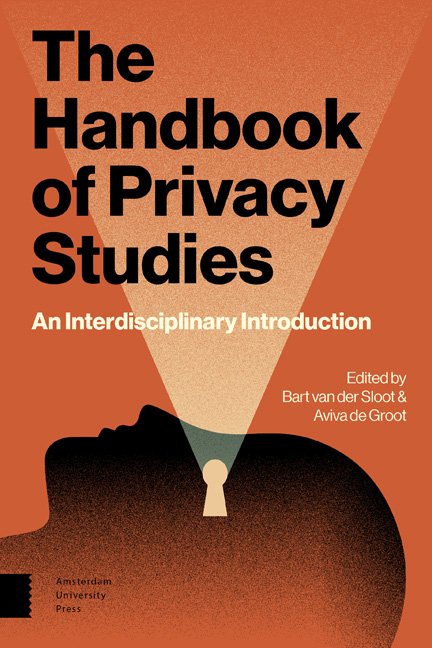Book contents
- Frontmatter
- Contents
- Introduction
- 1 Privacy from a Historical Perspective
- Legislating Privacy: Technology, Social Values, and Public Policy
- 2 Privacy from a Legal Perspective
- Three Dimensions of Privacy
- 3 Privacy from an Ethical Perspective
- Nudging: A Very Short Guide
- 4 Privacy from an Economic Perspective
- Security, Privacy, and the Internet of Things (IoT)
- 5 Privacy from an Informatics Perspective
- Political Science and Privacy
- 6 Privacy from an Intelligence Perspective
- A Privacy Doctrine for the Cyber Age
- 7 Privacy from an Archival Perspective
- Medical Privacy: Where Deontology and Consequentialism Meet
- 8 Privacy from a Medical Perspective
- Privacy Law – on the Books and on the Ground
- 9 Privacy from a Media Studies Perspective
- Diversity and Accountability in Data-Rich Markets
- 10 Privacy from a Communication Science Perspective
- Still Uneasy: a Life with Privacy
- 11 Privacy from an Anthropological Perspective
- About the Authors
11 - Privacy from an Anthropological Perspective
- Frontmatter
- Contents
- Introduction
- 1 Privacy from a Historical Perspective
- Legislating Privacy: Technology, Social Values, and Public Policy
- 2 Privacy from a Legal Perspective
- Three Dimensions of Privacy
- 3 Privacy from an Ethical Perspective
- Nudging: A Very Short Guide
- 4 Privacy from an Economic Perspective
- Security, Privacy, and the Internet of Things (IoT)
- 5 Privacy from an Informatics Perspective
- Political Science and Privacy
- 6 Privacy from an Intelligence Perspective
- A Privacy Doctrine for the Cyber Age
- 7 Privacy from an Archival Perspective
- Medical Privacy: Where Deontology and Consequentialism Meet
- 8 Privacy from a Medical Perspective
- Privacy Law – on the Books and on the Ground
- 9 Privacy from a Media Studies Perspective
- Diversity and Accountability in Data-Rich Markets
- 10 Privacy from a Communication Science Perspective
- Still Uneasy: a Life with Privacy
- 11 Privacy from an Anthropological Perspective
- About the Authors
Summary
Introduction
Before writing about the anthropological perspective on privacy I will need to briefly explain what constitutes an anthropological perspective and how it comes into being. The first ‘article’ of my anthropological Credo is context. Anthropologists study people, practices, words, thoughts, objects, traditions, institutions, and so on in their context, while many other disciplines do the opposite. No spoken or written word has a fixed meaning but derives its meaning from the sentence or the wider context in which it occurs. This insight forms the basis of the anthropological research approach. We cannot be sure of the meaning of people's words or actions if they are delivered to us out of context. If we have not seen the expression on the speaker's face and the situation in which s/he was when speaking, we cannot be sure of the intended meaning of the spoken words. Was the person at ease when s/he spoke or did s/he rather feel uncomfortable or annoyed? Was s/he perhaps ironic, was s/he lying or did s/he try to flatter or just to get rid of the visitor who asked him or her impertinent private questions? Was s/he impatient or did s/he rather enjoy the conversation with this visitor? Of course, we can never be absolutely certain what someone has in mind during a conversation, but being with him or her in the same context is the best we can do to capture someone's intentions.
The necessity of knowing the context implies that the anthropologist is present at the spot where the research takes place. Not as an interrogator and distant observer, but preferably as an engaged participant in the conversation and a respectful and empathic observer. Doing this kind of research requires that the researcher does not present himself as someone who knows but rather as a learner. Why should anyone tell me about their life if they believe that I already know everything? The conversation (I prefer that less formal term to ‘interview’) would turn into an exam or interrogation, the worst that can happen in fieldwork. Presenting oneself as a learner, a not-knowing visitor is not so much a clever trick by the researcher; it is the reality. The local ‘interlocutors’ (an unfortunate and clumsy term) are indeed the knowers while the visiting researcher is the not-knower.
- Type
- Chapter
- Information
- Handbook of Privacy StudiesAn Interdisciplinary Introduction, pp. 413 - 444Publisher: Amsterdam University PressPrint publication year: 2018
- 2
- Cited by

